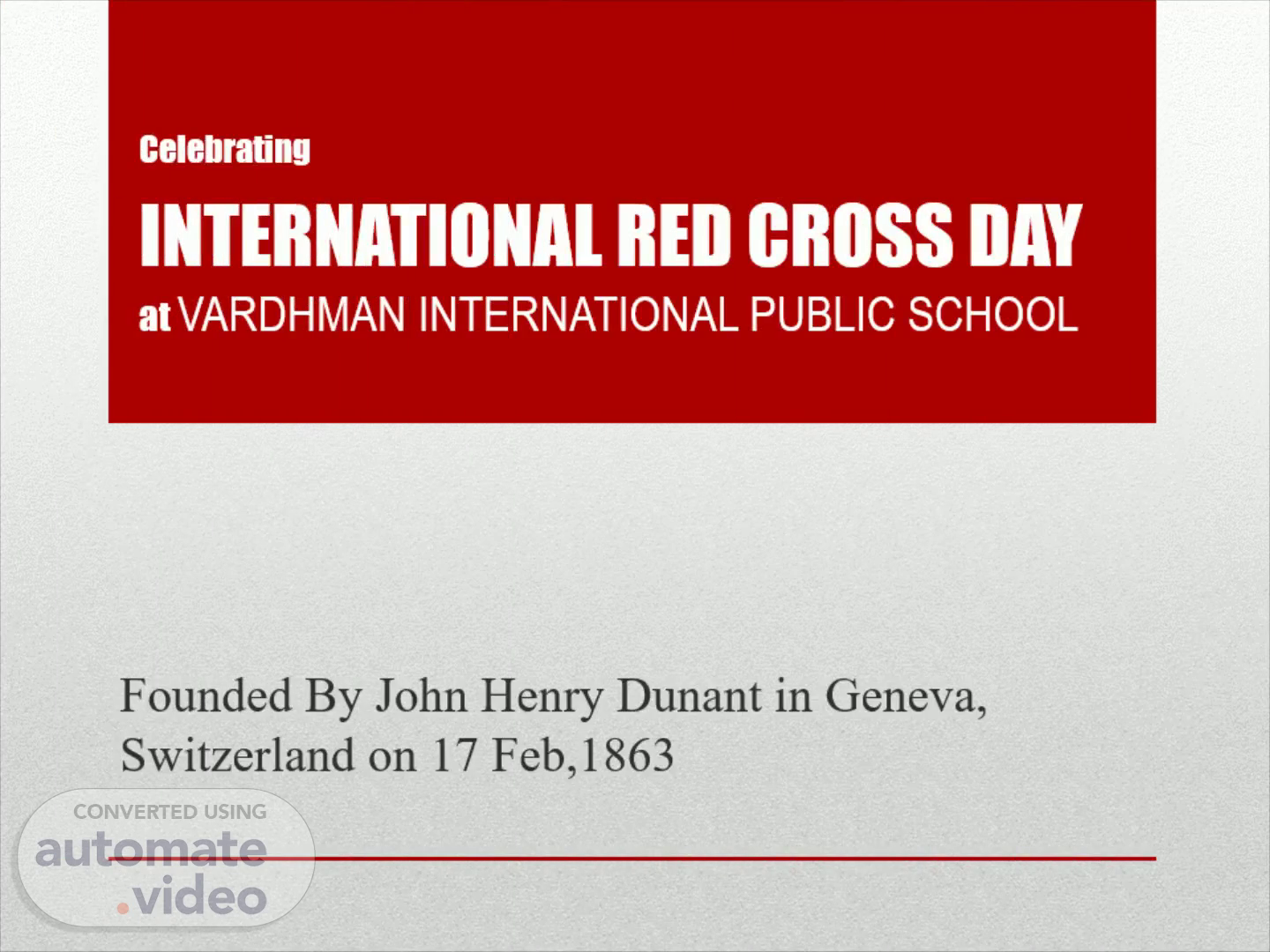
Celebrating INTERNATIONAL RED CROSS DAY at VARDHMAN INTERNATIONAL PUBLIC SCHOOL
Scene 1 (0s)
Celebrating INTERNATIONAL RED CROSS DAY at VARDHMAN INTERNATIONAL PUBLIC SCHOOL.
Scene 2 (11s)
The Red Cross is an independent, Non Governmental International Organization, Concerned with offering humanitarian assistance in war time and peace time disastrous situation..
Scene 3 (27s)
Dunant founded the organization after being touched by the intense suffering and neglect of wounded soldiers of the battle of Solferino, North Italy in 1859..
Scene 4 (39s)
He wrote a Book “Un Souvernir” that stirred the conscience of the world to render aid in war without distinction of nationality..
Scene 5 (51s)
SAIIIAIDV NVIUV11NVL,Nf7H.
Scene 6 (59s)
DISASTER RELLIEF ACTIVITIES Amencan Red Cross Relief.
Scene 7 (1m 6s)
SUPPLY OF RELIEF MATERIALS.
Scene 8 (1m 13s)
TEMPORARY SHELTERS.
Scene 9 (1m 19s)
IMG_1457 First Aid Box small. First Aid Training Emergency.
Scene 10 (1m 28s)
Preserve Life. Prevent Worsening. Promote Recovery.
Scene 11 (1m 39s)
. First aid kits. 4.
Scene 12 (1m 53s)
Gloves. Face shield. Plasters. Wound dressings. Eye pad.
Scene 13 (2m 8s)
Assessing the situation. What happened Number of casualties History, signs, symptoms.
Scene 14 (2m 35s)
ABC. A – Airway B- Breathing C- Circulation Check for pulse Pulse indicates the condition of the Circulation Check Pulse Carotid pulse Wrist pulse.
Scene 15 (2m 46s)
Airway - Blocked. Airway - Cleared. . The airway.
Scene 16 (2m 55s)
Pale clammy skin (for dark skin look at the colour of the skin inside the lips).
Scene 17 (3m 16s)
. Resuscitation (CPR). 8.
Scene 18 (3m 32s)
Chain of Survival Diagram. . Chain of survival. 8.
Scene 19 (3m 40s)
WARNING: In the first few minutes after cardiac arrest, a casualty may be barely breathing, or taking infrequent, noisy gasps. These are known as agonal gasps and should not be confused with normal breathing. If you are in doubt, start CPR..
Scene 20 (3m 58s)
Give five initial rescue breaths before starting chest compressions.
Scene 21 (4m 20s)
Airway blocked by the tongue.. Airway blocked by vomit..
Scene 22 (4m 30s)
Gurgling noises when giving rescue breaths?. Capture-000029a.
Scene 23 (4m 41s)
1. . Recovery position. 15. 2. 3. 4.
Scene 24 (4m 51s)
. Recovery position - baby. 15.
Scene 25 (5m 0s)
DO: Turn the casualty on to the opposite side every 30 minutes if they are in the recovery position for a prolonged period. Place a heavily pregnant casualty on her left side to help circulation..
Scene 26 (5m 21s)
Successful Resuscitation?. Capture-000032. . and finally….
Scene 27 (5m 30s)
Often happens whilst eating / drinking Ask “ are you choking? ”.
Scene 28 (5m 50s)
Cough !. 5 Back Blows. 5 Abdominal Thrusts. . Choking adult or child.
Scene 29 (6m 1s)
5 Back Blows. 5 Chest Thrusts. Arrow curved. . Choking baby.
Scene 30 (6m 11s)
Unconscious = Start CPR!. Capture-000060-a. . Choking – unconscious casualty.
Scene 31 (6m 21s)
After successful choking treatment, seek immediate medical attention if the casualty: Has received abdominal thrusts; Has difficulty swallowing; Has a persistent cough; OR Feels like ‘ an object is still stuck in the throat ’ ..
Scene 32 (6m 37s)
About one third. . Blood loss. 20.
Scene 33 (6m 47s)
Sit or Lay. Examine. Rapidly assess:. Type of bleed.
Scene 34 (7m 1s)
spurts. oozes. trickles. . Types of wound. 20.
Scene 35 (7m 11s)
For life-threatening bleeding that cannot be controlled by direct pressure.
Scene 36 (7m 35s)
For life-threatening bleeding that cannot be controlled by direct pressure.
Scene 37 (7m 46s)
Tetanus?. . Minor injuries – splinter. 25. 4.
Scene 38 (7m 58s)
calamine lotion to ease redness, itching or swelling.
Scene 39 (8m 9s)
Clean the blood and apply an antibacterial ointment or bandage.
Scene 40 (8m 20s)
COMMON NOSEBLEED ruRST AID DO'S & DON'TS SIT IN A CHAIR & LEAN THE HEAD FORWARD This will prevent any blcnxl from going down the back of the throat PINCH THE SOFT PART OF THE NOSE Direct pressure to control the b—'ing for 5-10 minutæ ICE PACK ON TOP NOSE AND CHEEK Helps control bleeding. swelling, and pain if there has been any trauma to the LIE DOWN OR TILT YOUR HEAD BACK This can cause blood to be swallowed which lead to choking, nausea, & vomiting PICK OR BLOW YOUR NOSE This could only cauæ more TAKE AN ASPIRIN This could only cause more bleeding because aspirin is a blood thinner Leam life-saving skills today Visit www.disastersurvivalskills.com to access fræ training, posters and preparedness tips.
Scene 41 (8m 49s)
Eye irrigation. . Eye injury - chemicals. 27.
Scene 42 (8m 58s)
1 2 3. Cool. Remove. . Burns treatment. Dress. 28.
Scene 43 (9m 7s)
Pain. Loss of power. Unnatural movement. Swelling or bruising.
Scene 44 (9m 20s)
Closed. Open. Complicated. . Types of fracture. Green Stick.
Scene 45 (9m 30s)
Dislocated. Normal. dislocated kneecap. . Dislocation.
Scene 46 (9m 38s)
Elevated Sling. . Slings.
Scene 47 (9m 50s)
Support Sling. . Slings.
Scene 48 (10m 1s)
Blow to head, neck or back (especially resulting in unconsciousness).
Scene 49 (10m 26s)
. Spinal injury. 30.
Scene 50 (10m 35s)
sugar. insulin. . Diabetes. Fixed amount injected:.